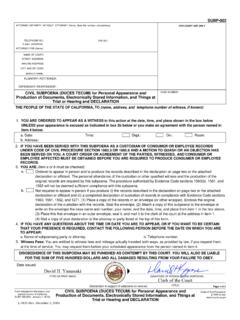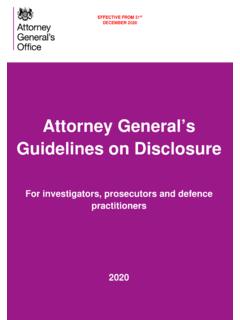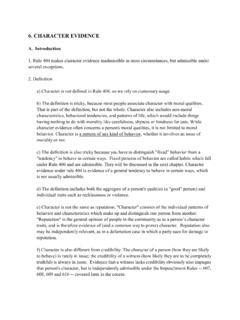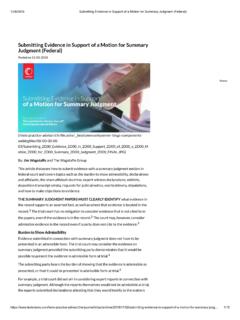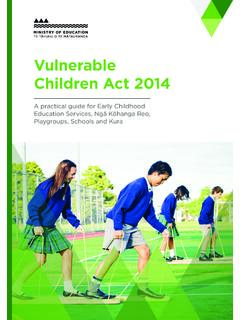Transcription of Witness statements - GOV.UK
1 Page 1 of 23 Published for Home Office staff on 6 February 2017 Witness statements Version archivedThis document was archived on 15 July 2019 Page 2 of 23 Published for Home Office staff on 6 February 2017 Contents Contents .. 2 About this guidance .. 4 Contacts .. 4 Clearance and publication .. 4 Changes from last version of this guidance .. 4 What is a Witness statement? .. 5 Definition of an admissible Witness statement .. 5 When you can produce a Witness statement as evidence in court .. 5 When you cannot produce a Witness statement as evidence .. 6 How the statement is used in court .. 6 Types of Witness statement .. 7 Victim personal statements .. 8 What is a VPS?.. 8 Purpose of VPS .. 8 When the VPS is used in court .. 8 Taking a Witness statement in England, Wales or Northern Ireland .. 9 Which form to complete and storing the Witness statement .. 9 What you must tell the Witness .. 9 Drafting the Witness statement.
2 9 Sign and check the Witness statement .. 10 If you need to read the statement to the Witness .. 10 If the Witness may have committed a crime or becomes a potential suspect .. 10 Taking a Witness statement outside of the UK .. 11 Taking a Witness statement using an interpreter .. 12 Completing a Witness statement .. 13 How you complete the Witness statement .. 13 What information you must include .. 13 Completing an officer s Witness statement .. 15 The main principles to follow when writing your statement .. 15 What to avoid when preparing a Witness statement .. 17 What you must never include in a statement .. 17 What you must avoid using in a statement .. 17 Property and exhibits in a Witness statement .. 18 archivedThis document was archived on 15 July 2019 Page 3 of 23 Published for Home Office staff on 6 February 2017 Introducing items .. 18 Referring to material found during a search in a Witness statement .. 18 The role of the case officer.
3 19 Identification and recognition in a Witness statement .. 20 Definition of a target .. 20 Identification .. 20 Surveillance records .. 20 Role of the case officer .. 20 Identification methods for Witness statements .. 21 Description evidence .. 21 If identification is at issue .. 22 Identification evidence: finding a suspect .. 23 archivedThis document was archived on 15 July 2019 Page 4 of 23 Published for Home Office staff on 6 February 2017 About this guidance This guidance tells criminal investigators in Immigration Enforcement (IE) the different types of Witness statements you might take and how to write them. The guidance includes: general information on the different types of Witness statements legislation relating to Witness statements writing a Witness statement for a Witness , or as an officer taking a Witness statement in or outside the UK Witness statements using an interpreter property and exhibits in a Witness statement victim personal statements points you must include and things to avoid in a statement identification and recognition statements Contacts If you have any questions about the guidance and your line manager or senior caseworker cannot help you or you think that the guidance has factual errors then email the CFI Operational Guidance team If you notice any formatting errors in this guidance (broken links, spelling mistakes and so on) or have any comments about the layout or navigability of the guidance then you can email the Guidance Rules and Forms team.
4 The Home Office has a duty to safeguard and promote the welfare of children for more information see: safeguard and promote child welfare Clearance and publication Below is information on when this version of the guidance was cleared: version published for Home Office staff on 6 February 2017 Changes from last version of this guidance new template minor housekeeping changes Related content Contents archivedThis document was archived on 15 July 2019 Page 5 of 23 Published for Home Office staff on 6 February 2017 What is a Witness statement? This page tells you about what a Witness statement is and how it is used in court. This only applies to statements taken in England, Wales and Northern Ireland. Definition of an admissible Witness statement To be admissible (allowed) in court section 9 of the Criminal Justice Act (CJA) 1967 states for a Witness statement to be used as evidence in any criminal proceeding, other than committal proceedings, it must: be a formal written document of a person be a set of facts relating to a certain event, or events be signed by the person who makes it, to confirm that the contents of the document are true, this is known as a statement of truth have had a copy served on the other parties before the trial If all of the above apply, the Witness does not always need to attend the trial to give oral evidence.
5 But once they have made a written statement they may be called on to attend court and give their evidence in person. The jury do not see Witness statements so the evidence contained in them will either be read out by counsel or be given orally by the person who has given the statement. When you can produce a Witness statement as evidence in court To be admissible in court, evidence must be relevant to a fact which has to be proved, or disproved. Nothing proves itself, and every fact, and document relied upon in court must be proved by admissible evidence. You can produce a Witness statement as evidence in court when: the relevant conditions in section 9 Criminal Justice Act 1967 are met: o this allows the defence to agree to a statement being read at trial where it has been served in advance to them section 116 Criminal Justice Act 2003 or section 117 Criminal Justice Act 2003 applies this allows first hand hearsay and business documents to be admitted as evidence schedule 1 paragraph 2 of the Criminal Procedure and Investigations Act 1996 (CPIA) applies: o this allows a written Witness statement to be read in court as evidence without further proof - this happens where both the defence and prosecution agree on what is written in the Witness statement Section 9 Criminal Justice Act 1967 only applies to statements taken in the UK.
6 The Crown Prosecution Service lawyer will decide what statements are to be used under section 9, and what exhibits will be produced as evidence. archivedThis document was archived on 15 July 2019 Page 6 of 23 Published for Home Office staff on 6 February 2017 When you cannot produce a Witness statement as evidence A written Witness statement is not admissible on its own as evidence at trial if the defence do not agree with the evidence that has been written within it. How the statement is used in court The statement will be read out at the hearing, only if it has been agreed by both the prosecution and defence. This allows for evidence to be given without having to call the Witness to attend. If there is no agreement, the statement will not be read out in court. A Witness may refer to specific documents in a statement and these documents or items of evidence will be produced as exhibits in the case. Any document or object referred to as an exhibit and identified in the statement will be treated as if it has been produced by the person who made the statement.
7 Related content Contents archivedThis document was archived on 15 July 2019 Page 7 of 23 Published for Home Office staff on 6 February 2017 Types of Witness statement This section tells you about the different types of Witness statements . It is good practice for you to take a Witness statement as soon as it becomes clear the Witness could be useful whilst the information is fresh in their mind. You can always take further statements at a later date if more evidence comes to light. Any written draft statement is unused material which you must give to the disclosure officer. There are 3 types of Witness statement: narrative statements : o made by the people who have played a part in the event at issue production statements : o made by people who are employees, who have access to computer systems or documents, but who cannot testify as to how the information was entered on to the systems, as it may have been done by other people in the organisation statements by expert witnesses: o include analysis and comment and can include personal opinion within their professional remit You must avoid any reference to confidential information or sources in the Witness statement.
8 For more information on witnesses who do not speak English, see: taking a Witness statement using an interpreter. Related content Contents archivedThis document was archived on 15 July 2019 Page 8 of 23 Published for Home Office staff on 6 February 2017 Victim personal statements This page tells you about what victim personal statements (VPS) are and how to complete one. What is a VPS? This is a statement made by the victim of a criminal offence. It is recorded on form MG11 and the content relates to the effect the offence has on them. To see a copy of this form, see: MG forms Purpose of VPS These statements provide the: victim with an opportunity to state how the offence has affected them: o physically o emotionally o psychologically o financially o in any other way victim an opportunity to say if they require further support, or wish to claim compensation Home Office and the courts with information on these matters and allow them to take account of the consequences of the offence on the victim These statements are voluntary and are separate to other statements .
9 They are disclosed to the defence. For more information, see: victim personal statements . When the VPS is used in court The VPS is put before the court after conviction in the sentencing bundle. For a leaflet on victim personal statements , see: making a victim personal statement leaflet Related content Contents archivedThis document was archived on 15 July 2019 Page 9 of 23 Published for Home Office staff on 6 February 2017 Taking a Witness statement in England, Wales or Northern Ireland This section tells you what you must do when you take a Witness statement in England, Wales or Northern Ireland. Which form to complete and storing the Witness statement If you take the statement in England, Wales or Northern Ireland, you must record it on an MG11, see: MG forms If you take or receive the statement in Northern Ireland you must make sure you sign the additional declaration. You must keep the original copies of all Witness statements in the case file and send copies to the Crown Prosecution Service.
10 What you must tell the Witness Before a Witness signs a Witness statement you must always explain: the perjury clause to them before you take the statement a statement taken in this form meets the legal requirements, and so they may not need to attend court: o but you must make it clear the Home Office cannot guarantee they will not have to attend the court because the court, and the defendant, have the right to call any Witness to attend and give oral evidence Drafting the Witness statement When you draft a Witness statement you must make sure: it is concise and to the point you only deal with matters within the Witness s direct knowledge as far as possible, it is in their words You may find it helpful to take notes before you begin writing the Witness statement. When you question the Witness you must make sure you: ask all relevant questions to satisfy your duty under the Criminal Procedure and Investigations Act 1996 pursue all reasonable lines of enquiry whether they point towards or away from the suspect For more information, see: Criminal Procedure and Investigations Act 1996 Manual of guidance and MG forms.










